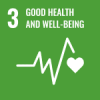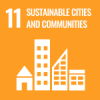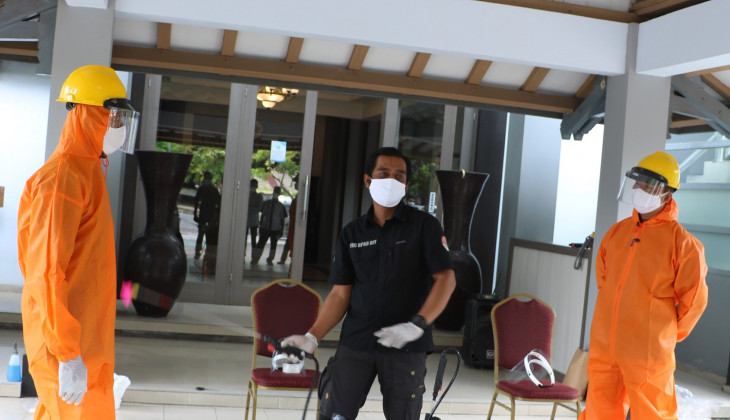Entering the new habits adaptation, Universitas Gadjah Mada held a Decontamination Training for work units and faculties within UGM. The training was attended by approximately 100 participants and presented two speakers, namely Endro Sambodo and Agus Riyanto, from the DIY Provincial BPBD Quick Reaction Team.
The head of Center for Security, Safety, Health, and Environment (PK4L) UGM, Drs. Arif Nurcahyo, S.Psi., revealed that the Covid-19 pandemic is not just a medical problem but a humanitarian problem in a practical sense. Covid-19 is a medical emergency that has an impact on psychosocial, economic, and others.
“Therefore, the Covid-19 issue is a shared responsibility in uncertainty among state policies that always extend the limitation period, it is time for the Covid-19 Task Force, including the UGM Covid-19 Task Force, to distribute their sovereignty duties and responsibilities to units and faculties as well,” he said at UC UGM on Wednesday (30/9).
Decontamination is a subject of learning how to clean up areas or afterward suspected people have been exposed. Not only the Covid-19 Task Force, who should always carry out this kind of problem but units or faculties also can contribute themselves to do it jointly.
According to Arief, Decontamination Training is more about the issue of knowledge transfer and skill transfer. Therefore, in addition to delivering material, BPBD DIY quick reaction team also implement the decontamination practices in vehicles, environments, and office areas by the
“The UGM Covid-19 Task Force invited BPBD to hold a Decontamination Training to prepare further steps and manage panic in the future when there is an incident, or someone is suspected of being exposed to Covid-19,” he said.
According to him, this kind of training is essential because reality cannot stop. Even over time, there is a possibility that the transmission cases will increase. According to Arief, the problem is not the number that continues to increase, but there are additional cases on how to behave.
“This is what decontamination training is implemented for vehicles, environment, and offices. Throughout this decontamination training, the UGM Covid-19 Task Force distributed its sovereign ability to units or faculties so that in the future, when stepping into a normal habit, they can be more prepared and more alert. There will not be a dependency on the UGM Covid-19 Task Force,” he explained.
In addition to delivering the material in the Decontamination Training, videos related to area decontamination, personnel decontamination, and staff flow decontamination at BPBD DIY were also presented. There were also simulations using complete PPE starting from google glasses, N95 masks, latex gloves, boots, and protective clothing reused after disinfecting and sterilization.
Endro Sambodo from BPBD DIY said BPBD DIY always cleaned ambulance crews or funeral crews and vehicles from the red zone when carrying packages. Vehicles from the red zone must be decontaminated.
So far, the health workers decontaminated by BPBD DIY have never had any cases of exposure. If many health workers have been exposed to Covid-19, then the health workers who make patient referrals in DIY must have immediately confirmed it to the hospital. However, so far, there have not been medical workers confirmed as being exposed to Covid-19.
“Maybe because of having a healthy lifestyle, using PPE properly, or presumably because of implementing decontamination,” he said.
Source: https://ugm.ac.id/id/berita/20147-ugm-selenggarakan-pelatihan-dekontaminasi



